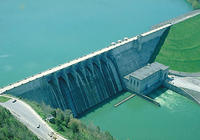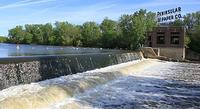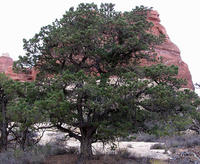-
Small modular reactors (SMEs) a “poor bet” to revive U.S. nuclear renaissance: report
A shift to small modular reactors (SMRs) is unlikely to breathe new life into the troubled U.S. nuclear power industry, since SMRs will likely require tens of billions of dollars in federal subsidies or government purchase orders, create new reliability vulnerabilities, as well as concerns in relation to both safety and proliferation, according a report issued last week.
-
-
Aging grid limiting exploitation of wind power potential
Energy firms and utility companies continue to invest in wind power, as evident in the increasing number of wind turbines on the prairies of the Midwest, but the aging infrastructure of the nation’s power grid is limiting the potential of this clean energy source.
-
-
Mapping out an alternative energy future for New York
New York governor Andrew Cuomo will soon decide whether to approve hydraulic fracturing for natural gas in the state. To date, no alternative to expanded gas drilling has been proposed.A new study finds that it is technically and economically feasible to convert New York’s all-purpose energy infrastructure to one powered by wind, water, and sunlight (WWS).
-
-
Testing feasibility of deep geological storage of CO2 emissions
An injection of carbon dioxide, or CO2, has begun at a site in southeastern Washington to test deep geologic storage. Researchers are injecting 1,000 tons of CO2 one-half mile underground to see whether the greenhouse gas can be stored safely and permanently in ancient basalt flows. The United States and portions of Canada have enough potential capacity in geologic formations to store as much as 900 years of CO2 emissions.
-
-
Powering 1,000 homes would require using 32 acres for solar power plants
The Energy Department’s National Renewable Energy Laboratory (NREL) has published a report on the land use requirements of solar power plants based on actual land-use practices from existing solar facilities. Powering 1,000 homes would require setting aside 32 acres for solar power plants.
-
-
Water reservoirs for hydroelectric dams are sources of greenhouse gas emissions

The large reservoirs of water behind the world’s 50,000 large dams are a known source of methane. Like carbon dioxide, methane is one of the greenhouse gases which trap heat near Earth’s surface and contribute to global warming. Methane, however, has a warming effect twenty-five times more powerful than carbon dioxide. The methane comes from organic matter in the sediments that accumulate behind dams.
-
-
Dams play an important role in water pollution control

Small dams, reservoirs and ponds trap water pollution, which provides an important benefit to water resources. This is especially relevant in agricultural lands of the Midwest U.S., where there are lots of small, but aging, dams.
-
-
Bacteria to clean contaminated leftover water used in fracking

Fracking is a drilling technique which uses lots of water — up to 5-7 million gallons per frack. One well may be fracked several times. The water goes in clean and comes out contaminated with organic substances that render it unfit for reuse. Purifying that water would reduce the pressure on waste disposal sites called injection wells, as well as on sites of wastewater spills. Researchers say that bacteria may someday clean leftover frack water.
-
-
Analysts: arrogance, clumsiness of oil and gas industry caused fracking’s bad image
Oil and gas industry experts say arrogance, secrecy, and poor communication by the drilling industry have led to public anger over hydraulic fracturing, or fracking. These experts are calling for fracking companies to release more information to alleviate public concerns about the relationship between the drilling technology and water contamination.
-
-
Well water contaminants highest near natural gas drilling: study
A new study of 100 private water wells in and near the Barnett Shale showed elevated levels of potential contaminants such as arsenic and selenium closest to natural gas extraction sites. Researchers believe the increased presence of metals could be due to a variety of factors including: industrial accidents such as faulty gas well casings; mechanical vibrations from natural gas drilling activity disturbing particles in neglected water well equipment; or the lowering of water tables through drought or the removal of water used for the hydraulic fracturing process. Any of these scenarios could release dangerous compounds into shallow groundwater.
-
-
Harnessing energy from wind whipping through urban concrete canyons
Two Drexel University students developed a wind-harvesting concept which would exploit the wind whipping through “concrete canyons” between buildings and skyscrapers in large urban centers. Their concept involves a system of wind turbines that could be installed in streets and spaces between buildings, using flexible sails to divert otherwise turbulent winds into a more useful stream.
-
-
State Department approves U.S.-Canada pipeline, but it is not Keystone
The State Department has approved a U.S.-Canada pipeline, but it is not the Keystone XL project which is still being debated. The Vantage Pipeline will carry ethane from North Dakota through Saskatchewan into Empress, Alberta.
-
-
Using invasive trees to develop jet fuel for U.S. Navy fighter jets

In western U.S. rangelands, native juniper and pinyon pine trees are spreading beyond their historical ecological niches and disrupting the environmental balance of their expanded range. Preliminary estimates suggest harvesting some of these hardy invaders every year could supply enough biomass to produce millions of gallons of renewable jet fuel for the U.S. Navy fighter jets.
-
-
U.K. water industry: fracking may contaminate U.K. drinking water
U.K. water companies have warned the shale gas industry that the quality of U.K. drinking water must be protected at all costs and fracking must not harm public health. Shale gas fracking could lead to contamination of the water supply with methane gas and harmful chemicals if not carefully planned and carried out.
-
-
More crude oil delivered to U.S. refineries by rail, truck, and barge
The use of rail, truck, and barge to deliver crude oil to refineries has increased, in part due to increases in U.S. crude oil production. Refinery receipts of crude by truck, rail, and barge remain a small percentage of total receipts, but the U.S. Energy Information Administration (EIA) notes that refineries across the nation received more than one million barrels per day (bbl/d) by rail, truck, and barge in 2012, a 57 percent increase from 2011.
-
More headlines
The long view
Trump Is Fast-Tracking New Coal Mines — Even When They Don’t Make Economic Sense
In Appalachian Tennessee, mines shut down and couldn’t pay their debts. Now a new one is opening under the guise of an “energy emergency.”
Smaller Nuclear Reactors Spark Renewed Interest in a Once-Shunned Energy Source
In the past two years, half the states have taken action to promote nuclear power, from creating nuclear task forces to integrating nuclear into long-term energy plans.
